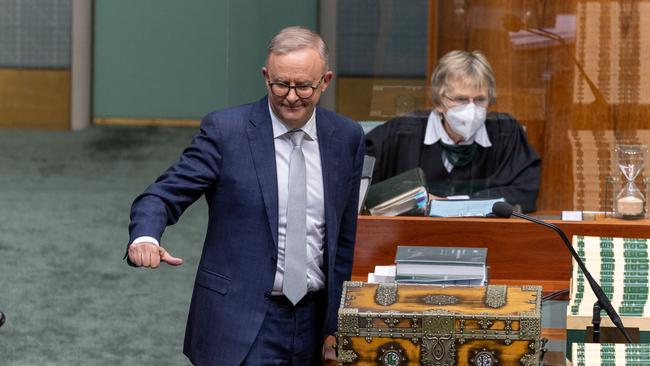Credit Suisse’s demise ends the great global bank lending boom: Robert Gottliebsen


Already we are seeing signs in the share market that point to the shape of this new lower growth business world.
Oil is in trouble, but mining is set to boom. Commercial property, particularly in the US, is in trouble but enterprises around the world, including Australia, are going to make themselves much more efficient.
If we recognise the changes this new world will bring, Australia can do well. The current signs are not encouraging, but that can change.
Our biggest single hazard is that we have a huge pool of low interest, fixed rate housing loans that are about to switch to interest rates that are much higher, which will trigger a big fall in consumer expenditure.
At the same time, unions, via the Fair Work organisation and other means, are seeking big pay rises.
The federal government looks like backing many of the rises.
It’s a dangerous cocktail because future wage rises will collide with an emerging business community that is different.
This time around, many companies know they can’t simply pass on wage cost rises in prices. In the emerging world, Australian enterprises from small to large will join other countries in being forced to work out how to run their enterprises more efficiently.
In the process, labour shortages will be slashed and the resulting unemployment and reduced working hours will see a great many more people unable to meet their mortgage payments. The rate of mortgage stress will balloon dramatically if the Albanese government curbs the gig economy, which is currently being used as an income boost by many Australians with high mortgages.

But it will also mean that interest rates will stop rising which will help those under mortgage stress, albeit that the inflation rate is likely to remain higher than the Reserve Bank targets.
One can’t underestimate the impact of the global capital shock that will come from the $US17bn ($25.31bn) wipe out of Credit Suisse hybrid securities.
In Australia, unlike Europe, similar securities convert to equity if a bank fails, but the investor caution that the Credit Suisse hybrid wipe out has created will spread into areas that have been benefiting from low interest rates and abundant loans.
In New York, parts of the commercial property, particularly empty offices, are scaring banks. It’s hard to believe that the US working from home change that is hitting American office values won’t be duplicated in parts of our commercial property market.
But global bank caution will go further. Governments that have borrowed as if there was no tomorrow will suddenly find the tap much harder to turn on.
In Australia, it will be the overleveraged Victorian government that gets hit first. The Albanese government has large spending commitments which have been ballooned by defence requirements. It won’t be easy to be in government when enterprises reduce their workforces at the same time as government cuts are required.

I am not in the business of predicting the NSW election outcome, but if the Coalition surprises, it may reflect a community fear that the ALP will struggle in this new environment.
While there will be strong areas of consumer spending where there is no mortgage stress, there maybe a recession in our major capital cities. But whether the nation itself goes into recession will depend on mining and agriculture.
Fortunes in agriculture will vary depending on commodity prices and climate. The global share market has already started to grasp that mining companies are going to be among the best performers in this new world.
We are seeing a pattern develop where oil is falling in price, partly reflecting the restrained global growth outlook. In contrast, many mineral prices are rising.
In time, we are going to replace oil energy with minerals as we move into an era of electrification.
The replacement starts with conventional minerals like copper nickel lithium and cobalt.
The new electrification facilities will require steel, which may be made differently. Uranium also joins that mix.
But we are also learning that a series of minerals which we currently classify as rare earths will become essential in new technologies not only in generating energy but in medicine.
No country in the world is better placed to benefit from this trend than Australia, but we haven’t yet woken up.
Our mining industry is being crippled by endless regulations and the difficulty of getting mines into operation. Other countries, led by the US and Canada, have already woken up to this fundamental world change and may beat Australia to the limited pool of available capital in this new world.
But it’s not too late because we have excellent ore bodies that have been discovered and are ready to develop if the road blockages are removed.
Australia is planning massive catch up defence expenditure, and it will not be easy to fund that expenditure simply by diverting spending priorities. What is needed is mining revenue growth, and the potential revenue is there.
It’s simply a question up whether Canberra and the states will wake up in time.






The collapse of Credit Suisse and the US banking crisis marks the end of the great global bank lending boom of recent years.